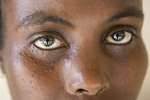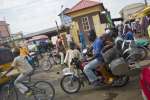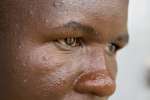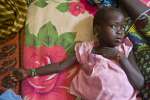Deadly Boko Haram attack forces more than 3,000 to flee to Niger
News Stories, 28 November 2014
NIAMEY, Niger, November 28 (UNHCR) – The UN refugee agency reported on Friday that a Boko Haram attack this week on the northern Nigerian town of Damassak left 50 people dead and forced at least 3,000 to flee to the Diffa region in neighbouring Niger.
"Dammasak, which lies just a few kilometres from the Niger border, was reportedly captured by Boko Haram on November 24," said a UNHCR spokesman, adding: "Our teams in Diffa say that people are still arriving in Niger from Nigeria as a result of the attack."
UNHCR field staff said that while most wait for boats to cross the Komadougou Yobé River separating the two countries, others try to swim across to safety. Local inhabitants in the area said they had seen people drowning while trying to cross the river.
Others were reportedly shot by Boko Haram who chased them as far as the river banks. According to the new arrivals, many displaced, mostly women, children, older people and some injured, were still waiting on the Nigerian side of the river to cross over to Niger.
The new arrivals said that many civilians were killed during the attack on Damassak, especially young men, but that insurgents were also shooting at women and children. Some said that they believed the attack was in reprisal for the enlistment of young men in self-defence groups, which have been formed to fight the insurgents.
Many children were separated from their parents during the attack and the escape to Niger. In the closest town, Chetimari, children and adults alike are wandering around the makeshift settlements, searching for relatives.
"Refugees said they had no time to collect any of their belongings and had to leave everything behind. With its partners and the local community, UNHCR has been providing plastic sheeting and blankets to help people put up temporary shelters and [as protection] against the night-time cold," said the UNHCR spokesman, Adrian Edwards, in Geneva.
After an attack on the Nigerian village of Malan Fatori on October 5, which prompted the flight of more than 1,000 people to Niger, Damassak is the second large attack occurring only a few kilometres away from the Nigerian-Niger border in less than two months. The increasing presence of the insurgents in close proximity to the border with Niger could lead to new displacements in the near future.
The regular influxes of Nigerian refugees and returning Niger nationals are placing a heavy burden on Diffa – a remote and economically underdeveloped region. According to authorities, more than 100,000 people have fled to Niger since May 2013, when the Nigerian government declared a state of emergency in three north-eastern states following attacks from Boko Haram.
More than 30,000 people have found refuge in the area in the past two months alone. "While local inhabitants have shared their meagre resources with the Nigerian refugees, we fear that the already fragile economic structure could collapse under the strain," Edwards noted.
Violence in Nigeria has also pushed more than 39,000 Nigerians to flee to Cameroon since then as well as 2,800 to Chad. In Nigeria, some 700,000 people are internally displaced in Borno, Yobe and Adamawa states, according to government figures.
By Benoit Moreno in Niamey, Niger


















































